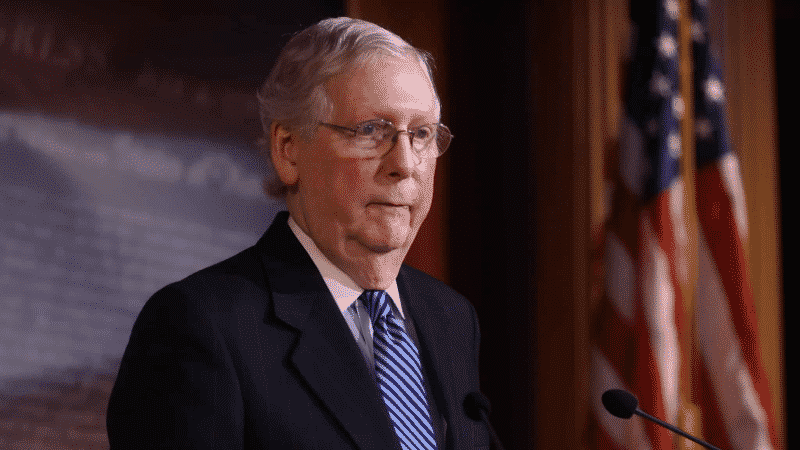Senate Majority Leader Mitch McConnell (R-Ky.) is vowing that an expansion for unemployment benefits will not be included for the next coronavirus stimulus package.
During a call with Senate Republicans on Wednesday, McConnell doubled down on his intent to “pause” before discussing plans for a “phase four” bill to combat the coronavirus, as The Hill reports.
However, McConnell did mull over the possibility of changes that could be implemented if Congress were to approve a fifth bill.
The Kentucky lawmaker expressed the desire to “clean up the Democrats’ crazy policy that is paying people more to remain unemployed than they would earn if they went back to work.”
“This will not be in the next bill,” McConnell said.
Sen. Lindsey Graham (R-S.C.), who previously sponsored an amendment to cap unemployment benefits, is reportedly in agreement with McConnell. At the Senate caucus luncheon on Tuesday, the South Carolina senator also asked President Donald Trump not to extend the expanded unemployment.
“I asked him not to agree to that. That we can’t,” Graham said. “You can extend some assistance, but you don’t want to pay people more unemployed than they made working.”
Senate Republicans’ concerns follow reports about workers declining to return to work amid the pandemic. Despite the ongoing threat of the coronavirus, Republicans argue the expanded unemployment benefits are the real reason some workers do not want to return to work.
In some cases, unemployed workers are receiving more through expanded unemployment than they would if they were working full-time, which leads Republican lawmakers to believe it disincentivizes working, as some senators have noted.

Treasury Secretary Steven Mnuchin has noted that furloughed workers who decline offers to return to work would be considered ineligible for unemployment benefits.
“If [businesses] offer back a worker and they don’t take that job, they will be required to notify the local unemployment insurance agency because that person will no longer be eligible for unemployment,” Mnuchin explained during his testimony before the Senate Banking Committee on Tuesday.

However, economic variables and pandemic-specific caveats in the CARES Act differ from the rules that typically apply for standard unemployment.
According to the U.S. Department of Labor (DOL), The CARES Act does provide Pandemic Unemployment Assistance for various coronavirus-related reasons.
“The CARES Act does provide PUA to an individual who is the ‘primary caregiver’ of a child who is at home due to a forced school closure that directly results from the COVID-19 public health emergency. However, to qualify as a primary caregiver, your provision of care to the child must require such ongoing and constant attention that it is not possible for you to perform your customary work functions at home.”
Another area of concern is partial employment. Even as workers are asked to return to work, full-time work may not be an option.
The CARES Act also includes eligibility for those partially employed with limited hours due to the pandemic. In several states, restaurants and businesses are only operating at a maximum of 50% capacity.
Due to limited operations and decreased revenue, many businesses may not be able to cover full-time wages which could be a new normal for quite some time.
While Graham has clarified that Trump has not agreed to halt expanded unemployment benefits, the president “agrees that that is hurting the economic recovery.”
As of Thursday morning, all 50 states are partially reopened. However, only 16 out of 50 states have shown a downward trajectory in new coronavirus cases — the number one requirement states must meet in order to reopen. At least 17 states have had upward trends as they begin to reopen, as of Tuesday.

























 Continue with Google
Continue with Google